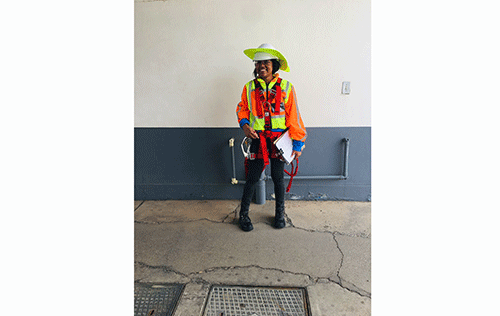Ranjeni Efraim
Civil engineer Rachel Amoomo is working tirelessly to get more girls into the broad field of engineering in Africa, and Namibia in particular.
Her efforts are geared towards correcting the gender imbalance that is still a norm in the engineering industry, which she described as a “challenging element to the women who have aspirations in the sector”.
“The first impression on sites is that you’re a woman and they look down on you, casting some scepticism that you are not capable,” Amoomo told Youth Corner, adding that this patriarchal notion threatens the sector.
She is adamant that women have the necessary capacity to have full participation in the field of engineering.
To get more girls interested in engineer, Amoomo (31) signed up as a WomEng Ambassador for the 1 milliongirlsinSTEM campaign – a 10-year global campaign initiated in 2017 to reach one million girls aged 13-18 to influence them into the science, technology, engineering and mathematics (STEM) fields of study.
Her aim is to infuse education in young girls, and to reinforce and leverage engineering and technology in Africa in general, and Namibia in particular.
Big dreams
“I have always been drawn to the science field. In grade 4 already, I wanted to become an astronaut or aeronautical engineer, inspired by the late Neil Armstrong, who was the first person to walk on the moon. And I wanted to challenge myself intellectually as the field of engineering has been always deemed one of the challenging career spectra and just for males,” she added.
Amoomo said she is satisfied to be making a career for herself in engineering. But working on a space station/ship remains on her bucket list “in terms of the assembling of the space station/ship, and integration of structural elements into the space station structure, e.g solar panels”.
Secondary to that dream, she would like to spark the young minds that aspire to be astronauts, and steer them in the right direction through STEM outreach campaigns and development programmes.
Education
Born in the rural village of Onekwaya west in the Ohangwena region, Amoomo attended the Onamutuni primary school and later attended the Jan Jonker Afrikaner high school in Windhoek. She attained a bachelor’s degree in civil engineering in October 2014 from the Namibia University of Science and Technology, and recently graduated with a master’s degree in engineering management from the University of Pretoria.
She had previously held senior positions in various engineering organisations such as secretary general of the Namibian Society of Engineers (NASE), and also a coordinator of the Engineers without Borders (EWB-Na).
Currently employed as a civil engineer at the Roads Authority, she said it is a fulfilling role that has laid a very strong foundation, and exposed her to the vast world of engineering and its diverse disciplines, ranging from engineering design and analysis, project management, asset management, contract administration, short- and long-term budgeting, and infrastructure lifecycle planning.
“With this enriching experience, I definitely plan to start a company to create employment and serve the industry by taking a lead on capital projects and providing the best technical, yet innovative solutions”.
Making an impact
Asked why she chose engineering, the mother of three said she loves making an impact in communities and changing the lives of people, especially on a technical level – be it service provision or information dissemination.
“I am fascinated by the ability to create something from nothing – which is what constitutes engineering – for instance, designing and constructing a beautiful multi-storey structure or road where there was once just shrub and rubble,” Amoomo observed passionately.
She believes that engineers by default become creators because from ensuring running water, to internet and artificial intelligence and other technical prosperities, all evolve around engineering.
However, Amoomo is persistently concerned about the lack of adequate water and sanitation infrastructure in rural areas. What makes it worse is that the youth are just folding their arms unconcerned, instead of forming joint ventures to tackle these thorny issues.
She thus urged the youth to not be afraid to challenge themselves, to not conform to “normality”, and to always try to stretch their endeavours to the limit.
To this effect, Amoomo recently took part in a motivational crusade to learners from various schools across the city. The event was organised by Ndjuluwa97 as part of its Career Event Exchange Programme.
Transfomation needed
She further posits that transformation is needed in the engineering industry, starting with amending the colonial laws governing the engineering profession (Engineering Profession Act 18 of 1986).
“Other aspects (of transformation) include the absence of adequate and modern governing instruments, such as
the absence of a specific regulatory framework for the construction industry”.
– efraimnanjeni@gmail.com


